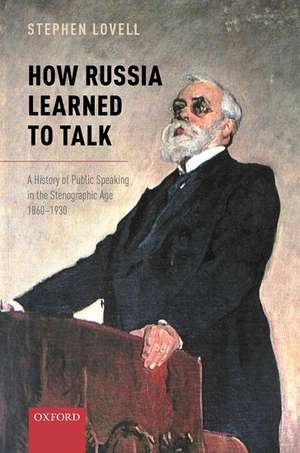How Russia Learned to Talk: A History of Public Speaking in the Stenographic Age, 1860-1930: Oxford Studies in Modern European History
Autor Stephen Lovellen Limba Engleză Hardback – 13 mar 2020
Din seria Oxford Studies in Modern European History
- 30%
 Preț: 673.53 lei
Preț: 673.53 lei - 13%
 Preț: 278.29 lei
Preț: 278.29 lei -
 Preț: 222.12 lei
Preț: 222.12 lei - 6%
 Preț: 234.19 lei
Preț: 234.19 lei - 16%
 Preț: 707.37 lei
Preț: 707.37 lei - 25%
 Preț: 522.10 lei
Preț: 522.10 lei - 17%
 Preț: 582.53 lei
Preț: 582.53 lei - 17%
 Preț: 583.54 lei
Preț: 583.54 lei - 16%
 Preț: 584.33 lei
Preț: 584.33 lei - 25%
 Preț: 582.12 lei
Preț: 582.12 lei - 30%
 Preț: 623.22 lei
Preț: 623.22 lei - 30%
 Preț: 486.56 lei
Preț: 486.56 lei - 14%
 Preț: 321.01 lei
Preț: 321.01 lei -
 Preț: 341.60 lei
Preț: 341.60 lei - 27%
 Preț: 832.43 lei
Preț: 832.43 lei -
 Preț: 309.69 lei
Preț: 309.69 lei - 30%
 Preț: 729.14 lei
Preț: 729.14 lei - 25%
 Preț: 877.94 lei
Preț: 877.94 lei - 12%
 Preț: 351.71 lei
Preț: 351.71 lei - 14%
 Preț: 297.87 lei
Preț: 297.87 lei - 14%
 Preț: 295.23 lei
Preț: 295.23 lei - 13%
 Preț: 240.04 lei
Preț: 240.04 lei - 30%
 Preț: 671.46 lei
Preț: 671.46 lei - 30%
 Preț: 613.37 lei
Preț: 613.37 lei - 27%
 Preț: 662.35 lei
Preț: 662.35 lei - 17%
 Preț: 582.46 lei
Preț: 582.46 lei - 17%
 Preț: 581.77 lei
Preț: 581.77 lei - 16%
 Preț: 584.42 lei
Preț: 584.42 lei
Preț: 601.69 lei
Preț vechi: 818.12 lei
-26% Nou
Puncte Express: 903
Preț estimativ în valută:
115.15€ • 119.77$ • 95.06£
115.15€ • 119.77$ • 95.06£
Carte disponibilă
Livrare economică 13-19 martie
Preluare comenzi: 021 569.72.76
Specificații
ISBN-13: 9780199546428
ISBN-10: 0199546428
Pagini: 340
Ilustrații: 14 black and white illustrations
Dimensiuni: 161 x 236 x 26 mm
Greutate: 0.7 kg
Editura: OUP OXFORD
Colecția OUP Oxford
Seria Oxford Studies in Modern European History
Locul publicării:Oxford, United Kingdom
ISBN-10: 0199546428
Pagini: 340
Ilustrații: 14 black and white illustrations
Dimensiuni: 161 x 236 x 26 mm
Greutate: 0.7 kg
Editura: OUP OXFORD
Colecția OUP Oxford
Seria Oxford Studies in Modern European History
Locul publicării:Oxford, United Kingdom
Recenzii
This study significantly advances our understanding of late imperial Russian political history.
Stephen Lovell masterfully shows how the forms of public talk changed in the longue durée. Moreover, he manages to give short biographical sketches of dozens of protagonists of his story.
Stephen Lovell masterfully shows how the forms of public talk changed in the longue durée. Moreover, he manages to give short biographical sketches of dozens of protagonists of his story.
Notă biografică
Stephen Lovell is Professor of Modern History at King's College London. His previous books include the prize-winning Summerfolk: A History of the Dacha, 1710-2000 (2003) and Russia in the Microphone Age: A History of Soviet Radio, 1919-1970 (2015).
